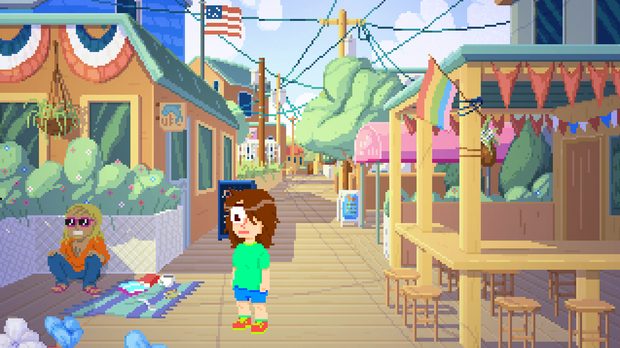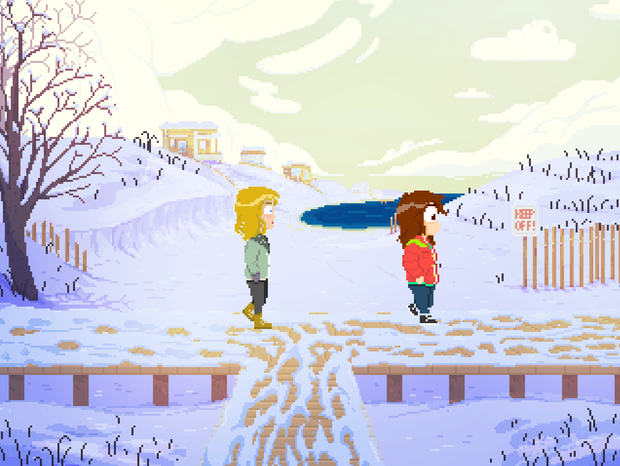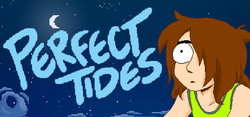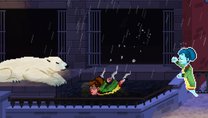Perfect Tides review

- 1 Comment
A near-perfect adventure about coming of age in the early 2000s
I'm in a unique place to evaluate Perfect Tides. Like Mara Whitefish, its fifteen-year-old protagonist, I grew up in a tiny American tourist town at the turn of the millennium, and many of the circumstances she deals with throughout the game were mine, once upon a time. I remember vividly how strange it felt, pre-cell-phone, to call a place home that catered mostly to visitors; how maddening it was to be full of desires and ambitions, yet told I was too young to know what I wanted; how the still-developing internet could feel like my only escape route into the wider world, where a young person could finally be taken seriously by others who shared their interests. Believe me: if there was a lie, a dodge, or an easy out in Perfect Tides, I’d have seen it.
There isn’t. Perfect Tides captures the sensation of being that age at that time so breathtakingly well that I had to take occasional breaks to resurface into the present. It felt, at times, like being visited by my own ghost. Even so, I couldn’t stay away for long; this isn’t just a well-told story, but a stellar adventure game, and it uses all the genre’s strengths to plant you firmly in Mara’s head over the course of a year. (Roughly eight hours in game time.) It pulls off nearly everything it attempts with grace, wit, and unblinking honesty, and it’s all the more impressive for being developer Meredith Gran’s first game.
The titular island of Perfect Tides is a small resort community on the east coast, overrun with tourists in the summers but downright moribund once they leave. It’s an abysmal place for a teenager to live, with businesses closed for most of the year and no connection to the mainland except by a ponderous ferry. Mara, when we first meet her, is practically bursting with the desire to leave. She dreams of being a famous author one day, of moving far away and becoming something more than the shy, nervous weirdo she feels like now—but for the time being her family and school obligations mean she’s stuck where she is.

In the wake of her father’s recent death, Mara feels isolated from her grieving mother and overprotective brother, Timothy. She has few social connections: Lily, her best friend, now spends more time with the in-crowd from their mainland high school than with Mara, who can’t shed her reputation as an awkward nerd. Her neighbor Simon, a writer himself, encourages her but never lets her forget how young she is. The only place she feels truly at home is in an online forum where she shares her writing, but her internet access is limited and conditional on her good behavior. All she can do is keep her head down and trudge toward a future that feels agonizingly far off.
The player guides Mara from spring to winter of the year 2000, with the game organized into four seasonal chapters. The story follows several throughlines in Mara’s life, including her struggles with school, her evolving relationship with her family and friends, her entry into new social circles, and her hesitant exploration of romantic relationships. As the island changes with each season—tranquil green paths and smooth waters in spring giving way to tourist-packed thoroughfares and busy beaches in summer, for instance—so too does Mara, with her outfits and appearance updating to reflect both the weather and the passage of time. Artist Soren Hughes’s pixel art backgrounds are gorgeous across the board, and the lo-res character models are packed with personality.
The characters themselves are all deep, complex individuals; even seemingly insignificant NPCs often have hidden depths once you get to know them. Nobody feels caricatured or one-dimensional, and the elastic, cartoony art belies a grounded and very human approach to storytelling. (Though make no mistake, as a game it’s often hilarious.) The animation is stellar, especially in closeups, and allows each character a range of emotions that surpasses their ancestors in games like King's Quest VII and Torin's Passage.
Each chapter has a central story that you’ll progress through, with puzzles you’ll have to solve and mandatory steps to take before time can advance. In spring, for instance, you have to balance chores and school with social engagements; in summer you'll scheme with Lily to get on camera as TRL films nearby. (Look it up, you philistines.) There are also a plethora of optional tasks, choices and side projects that can shape how the story unfolds. Perfect Tides does an excellent job of making these feel like achievements you discovered through your own creativity, just as Mara would: there’s no big signpost explaining that she can revive her father’s now-empty garden, for instance, or that doing so might eventually open up other possibilities, but putting two and two together will allow you to experience parts of the game that you might easily have missed.
The puzzles themselves aren’t usually too brain-taxing, and they mostly feel organic to both the story and Mara’s abilities. Some are inventory-based; in others you’ll have to navigate social interactions or find a way to connect two people who can solve each other’s problems. You won’t always receive guidance on where to go next, and you’ll have to wander the island looking for things to do or opportunities to get into mischief. It’s an effective way to make you feel like a bored teen in a dead-end town, but it can work a little too well, leaving you ambling aimlessly until you stumble by accident onto something that’s changed since you last visited. (There’s also one early puzzle with a solution so baffling that I still don’t know how I was supposed to have solved it myself. Anyone who figures it out intuitively—it involves bubble wrap—maybe quit your job and write walkthroughs for a living.)
The interface takes heavy inspiration from Sierra titles of the 1990s, with a drop-down menu at the top of the screen containing the traditional verb icons (walk, look, take/use, talk), your inventory, and the save/load menu. (You can also cycle through icons with the right mouse button, as the ancients decreed.) Second-person narration describes Mara’s thoughts, feelings and observations as you interact with the environment, and rarely has a narrator’s “you” felt more simultaneously indicative of both character and player; the text is so evocative of a young person’s thoughts and feelings that I found myself taking Mara’s side even when I knew, objectively, that she was wrong.
And that—the fact that Mara often is wrong, and the game allows her to be without judgment—is what elevates Perfect Tides from a good game to a great one. Media is littered with portrayals of teenagers as they appear through adult eyes: volatile half-people, unfinished and incoherent, who think they know everything but lack the capacity for reason. Perfect Tides takes the time to remember what youth feels like from the inside: to be, in each moment, the most complete person you’ve ever been, and to feel nonetheless penalized at every step for your failure to move with grace and wisdom through a world you’re still trying to understand.
Mara often makes bad decisions. She lashes out at loved ones for imagined slights; she rebels in destructive ways and does things simply because she shouldn’t; she responds ungratefully to people who’ve given as much as they can. But the narration lets us see those moments through her eyes; we know the helplessness and the longing within her that the rest of the world can’t see, and we’re witness to those parts of her that cry out to be acknowledged as she flails for some modicum of agency. We feel her full-hearted desire for a distant, barely conceivable future; her gnawing, ever-present fear that she’ll never reach it; her frustration and rage at the way her reach has grown vaster than ever while her grasp has stayed the same.
Perfect Tides doesn’t just understand these teenage feelings; it respects them. The triumphs, the failures, the heartbreaks of youth don’t matter simply because they’ll inform who someone grows into, it argues—they matter because they’ve happened to someone at all. Though we grow beyond them as time passes, the people we used to be were as real in their time as we are now, and what we may dismiss now as childhood drama or overreaction once felt like the most important moments in the world. Perfect Tides allows room for the possibility that maybe, for a little while, they really were.
Final Verdict
At fifteen years old I’d have said you were crazy to suggest that a life like mine might make a compelling adventure game. (Well, something like that, at least. It might have been “Great idea, dumbass.”) These decades later, I’m ecstatic that Perfect Tides exists to prove me wrong. It understands that growing up is an adventure, and not in a hackneyed, overly sentimental way; rather, the journey toward adulthood is an uncertain one, full of trials, dangers, and unexpected challenges, and none who survive it do so entirely unscathed. Perfect Tides gives grown players a chance to revisit that journey while considering the people we used to be; younger people will find a preview of the sorts of things that might lie ahead. Regardless of your age, this is a heartfelt, gripping adventure game that stands shoulder to shoulder with the best of them. I’m jealous of anyone who’s yet to play it for the first time.
Hot take
Perfect Tides is a beautifully realized game about growing up and finding one’s place in the world; alternately hilarious and heartbreaking, it treats its subjects with honesty and respect, and it never forgets what "adventure" really means.
Pros
- Excellent writing that perfectly captures the mindset of an early 2000s teenager
- Well-developed, three-dimensional characters
- Beautiful pixel art backgrounds and wonderfully expressive animation
- Full of things to do, both in the main story and in optional side tasks
Cons
- Sometimes hard to know where to go next
- One very poorly clued puzzle early on
Will played his own copy of Perfect Tides on PC.











1 Comment
Want to join the discussion? Leave a comment as guest, sign in or register in our forums.
Great review
Reply
Leave a comment